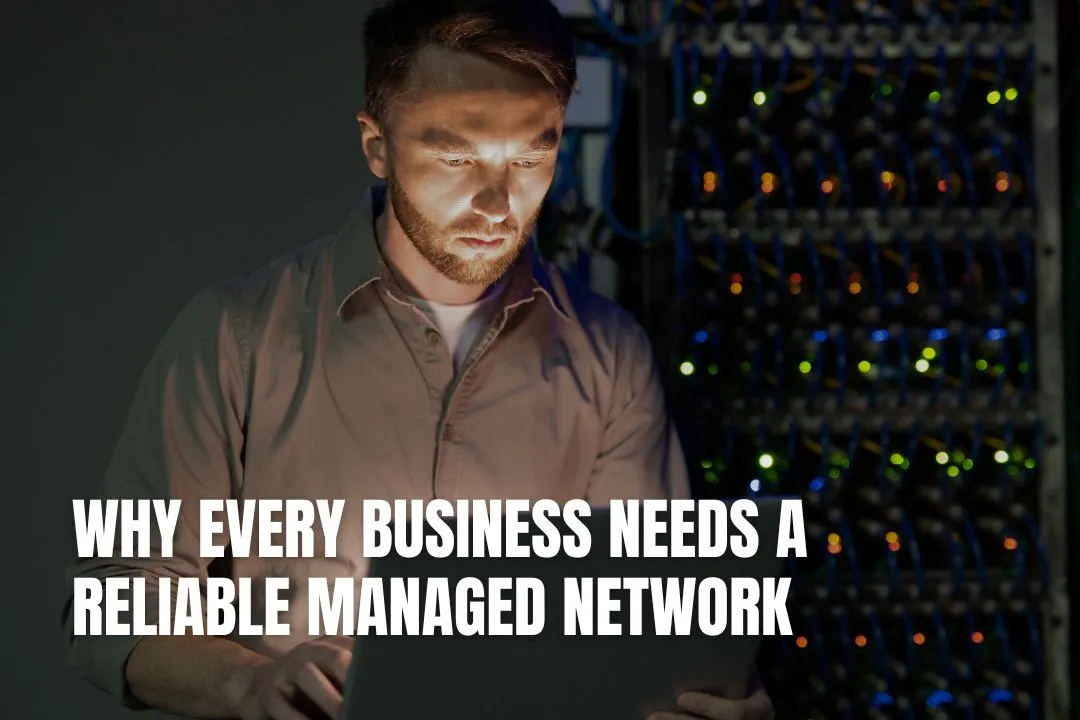
Editorial Disclaimer
This content is published for general information and editorial purposes only. It does not constitute financial, investment, or legal advice, nor should it be relied upon as such. Any mention of companies, platforms, or services does not imply endorsement or recommendation. We are not affiliated with, nor do we accept responsibility for, any third-party entities referenced. Financial markets and company circumstances can change rapidly. Readers should perform their own independent research and seek professional advice before making any financial or investment decisions.
Running a modern business without a solid network infrastructure is like trying to navigate a ship without a compass. Everything from daily operations to customer interactions depends on connectivity, yet many companies still treat their networks as an afterthought until something goes wrong.
The reality is that network downtime costs real money and damages reputations. When systems go offline, employees can't work, transactions fail, and customers lose confidence. For businesses of all sizes, having a reliable managed network is essential to staying competitive and operational, and here's why.
Every minute your network is down translates to lost revenue and productivity. Studies show that even brief outages can cost small businesses thousands of dollars, while larger enterprises may lose significantly more. The unpredictability of network failures makes this even more challenging; you never know when a critical system might fail during a crucial business moment.
This is where managed network services become invaluable. Rather than waiting for problems to surface, these services take a proactive approach through continuous monitoring and maintenance. Service providers watch your network infrastructure around the clock, identifying potential issues before they escalate into full-blown crises.
When problems do arise, response times are dramatically faster because experts are already watching and can often fix issues remotely before users even notice something went wrong. The peace of mind this provides cannot be overstated. Business owners and IT managers can focus on strategic initiatives instead of constantly firefighting network emergencies. Meanwhile, employees experience fewer disruptions, maintaining their productivity and morale.
Cybersecurity threats have grown exponentially in both frequency and sophistication. Small businesses often believe they're too insignificant to be targeted, but hackers frequently see them as easy entry points precisely because they lack strong security measures. Unfortunately, there's regulatory compliance to consider, customer trust to rebuild, and potential legal liabilities to address.
Managed security through professional network management provides multiple layers of protection that most internal IT teams struggle to maintain alone. This includes regular firewall firmware updates, intrusion detection systems, and continuous monitoring for suspicious activity. Security controls are regularly assessed and updated to address emerging security threats, closing security gaps before attackers can exploit them.
What's particularly valuable is the expertise that comes with managed security services. These providers employ specialists who dedicate their careers to understanding the latest attack vectors and defense strategies. They know how to implement security practices that align with industry standards and regulatory requirements, something that's increasingly important as compliance frameworks become more stringent.
Most small to mid-sized businesses can't justify the cost of building an enterprise network with all the bells and whistles that large corporations enjoy. Hiring specialized network engineers, maintaining Network Operations Centers, and investing in cutting-edge technology would consume budgets that could be better spent on core business activities.
Managed networks level this playing field considerably. Through these arrangements, smaller organizations gain access to enterprise-grade solutions they couldn't afford independently. This includes advanced capabilities like Managed SD-WAN for optimizing traffic across multiple locations, virtual private networks for secure remote access, and cloud service integration that enables flexible, scalable operations.
Human expertise is equally important. Network engineering requires staying current with rapidly evolving technologies and best practices. Service providers maintain teams of specialists across different areas, ensuring that someone with the right knowledge addresses each issue. This depth of expertise simply isn't feasible for most companies to develop internally.
Business needs change, sometimes rapidly. You might open new network locations, need to support sudden remote work expansion, or integrate new applications that demand more bandwidth. Traditional network infrastructure often struggles with these transitions, requiring significant time and investment to accommodate growth.
A properly managed approach to network infrastructure offers the flexibility modern businesses require. Adding new users or locations becomes straightforward rather than a months-long project. Network complexity is handled by providers who understand how to integrate different components smoothly. It could be fiber solutions for high-speed connectivity or Managed WiFi service for office environments.
This scalability also works in both directions. If business needs a contract temporarily, you're not stuck paying for unused capacity or managing equipment that sits idle. The service can adjust to match current requirements, making your technology spending more efficient and aligned with actual business conditions.

Traditional IT infrastructure comes with unpredictable expenses that make budgeting challenging. Hardware fails unexpectedly, emergency repairs demand immediate funding, and technology becomes obsolete faster than anticipated. These surprise costs create headaches for financial planning and can strain resources during already difficult periods.
Managed networks typically operate on subscription models with clearly defined Service Level Agreements that outline exactly what's covered. This transforms IT infrastructure from a capital expense with variable maintenance costs into a predictable operational expense. You know what you're paying each month, and you know what level of service to expect in return.
This predictability extends beyond simple cost management. Service-Level Agreements establish response time commitments and performance standards, giving you recourse when service doesn't meet expectations. There's accountability built into the relationship, something that's harder to establish with piecemeal vendors or internal teams juggling multiple priorities.
Perhaps the most compelling reason to embrace managed networks is the strategic advantage they provide. When you're not constantly dealing with network management issues, your attention and resources can shift to what drives business growth.
Your internal team, if you have one, can focus on business-specific technology projects rather than keeping the lights on. Instead of troubleshooting connectivity issues or managing incident response for security events, they can work on initiatives that differentiate your business and create competitive advantages.
As businesses become increasingly dependent on digital infrastructure, the network that connects everything becomes more critical than ever. Partnering with the right third-party service provider to manage that infrastructure means that you're making a smart strategic decision that positions your business for sustainable success in an increasingly connected world.
A managed network service means a third-party provider takes full responsibility for managing your business's network infrastructure. This includes everything from continuous monitoring and maintenance to security updates and troubleshooting, ensuring your network runs smoothly without you needing to handle the day-to-day operations.
Managed networks help you save money by reducing costly downtime, preventing expensive emergency repairs, and converting unpredictable capital expenses into predictable monthly operational costs. You also avoid the significant investment required to hire and maintain an in-house team of network specialists and purchase enterprise-grade equipment.
Not at all! While large corporations certainly benefit, managed network services are particularly valuable for small to mid-sized businesses. They level the playing field by giving you access to enterprise-level technology and expertise that you might not otherwise be able to afford, helping you stay competitive.
Managed networks significantly boost your security by providing multiple layers of protection, including regular firewall updates, intrusion detection systems, and continuous monitoring for suspicious activity. Providers employ specialists who stay current with the latest threats and defence strategies, ensuring your security measures are always up-to-date and robust.
Absolutely. Managed networks are excellent for supporting remote work. They can integrate solutions like virtual private networks (VPNs) for secure remote access and ensure your network infrastructure is flexible enough to handle increased demands from employees working from various locations, maintaining productivity and security.